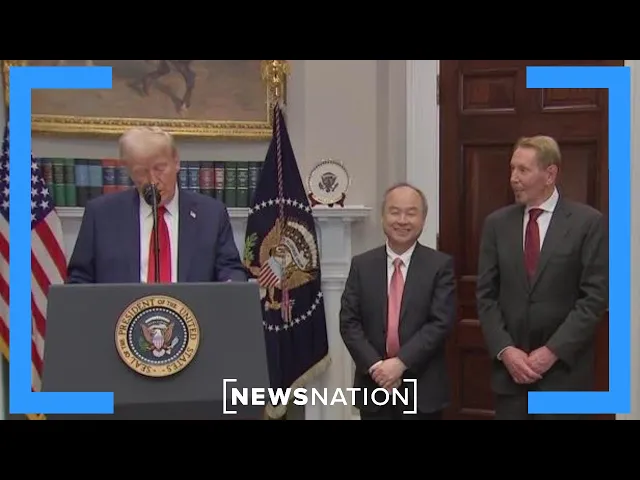Trump to reveal his administration’s AI action plan

Trump's AI plan reveals tech strategy priorities
As the election cycle intensifies, former President Donald Trump's team appears to be prioritizing artificial intelligence policy as a key component of their campaign strategy. This unexpected but well-timed focus on AI comes as both major parties scramble to establish definitive positions on regulating and leveraging an increasingly influential technology. The announcement that Trump will soon unveil a comprehensive AI action plan signals that technology policy may become a more central campaign issue than in previous elections.
Key developments from this announcement:
- Trump's team is developing a complete AI framework that would guide policy decisions should he return to office, marking a significant shift toward proactive technology planning
- The strategy appears to focus on American technological competitiveness against China, continuing previous administration priorities
- Campaign advisors have hinted that the plan will emphasize free market approaches over strict government regulation, likely allowing more flexibility for private sector AI development
The most striking aspect of this development isn't the announcement itself, but rather what it represents: the mainstreaming of AI as a political campaign issue. Just a few years ago, artificial intelligence remained largely a niche technology concern primarily discussed among industry insiders and futurists. Today, we're seeing presidential candidates formulate dedicated policy platforms around it—a remarkable evolution that underscores how rapidly AI has moved from speculative technology to practical reality affecting everything from national security to everyday business operations.
This shift matters tremendously for business leaders across sectors. When presidential candidates develop specific technology platforms, it signals that significant regulatory changes may follow depending on election outcomes. Companies investing heavily in AI capabilities—from small businesses implementing machine learning for customer service to enterprises building proprietary large language models—now face a more complex strategic landscape where political outcomes could substantially impact return on technology investments.
What's particularly noteworthy about Trump's approach is the apparent emphasis on competitiveness rather than caution. While the Biden administration has focused substantial energy on developing AI safety frameworks and promoting responsible innovation, early indications suggest Trump's plan may prioritize accelerating American AI development with fewer regulatory constraints. This presents a stark policy contrast that could significantly influence how businesses approach AI investment decisions.
For business leaders, this divergence in approaches creates both opportunity and uncertainty. A more permissive regulatory environment might allow faster implementation of cutting-edge AI solutions, potentially accelerating productivity gains and new product development. However, it also raises questions about
Recent Videos
How To Earn MONEY With Images (No Bullsh*t)
Smart earnings from your image collection In today's digital economy, passive income streams have become increasingly accessible to creators with various skill sets. A recent YouTube video cuts through the hype to explore legitimate ways photographers, designers, and even casual smartphone users can monetize their image collections. The strategies outlined don't rely on unrealistic promises or complicated schemes—instead, they focus on established marketplaces with proven revenue potential for image creators. Key Points Stock photography platforms like Shutterstock, Adobe Stock, and Getty Images remain viable income sources when you understand their specific requirements and optimize your submissions accordingly. Specialized marketplaces focusing...
Oct 3, 2025New SHAPE SHIFTING AI Robot Is Freaking People Out
Liquid robots will change everything In the quiet labs of Carnegie Mellon University, scientists have created something that feels plucked from science fiction—a magnetic slime robot that can transform between liquid and solid states, slipping through tight spaces before reassembling on the other side. This technology, showcased in a recent YouTube video, represents a significant leap beyond traditional robotics into a realm where machines mimic not just animal movements, but their fundamental physical properties. While the internet might be buzzing with dystopian concerns about "shape-shifting terminators," the reality offers far more promising applications that could revolutionize medicine, rescue operations, and...
Oct 3, 2025How To Do Homeless AI Tiktok Trend (Tiktok Homeless AI Tutorial)
AI homeless trend raises ethical concerns In an era where social media trends evolve faster than we can comprehend them, TikTok's "homeless AI" trend has sparked both creative engagement and serious ethical questions. The trend, which involves using AI to transform ordinary photos into images depicting homelessness, has rapidly gained traction across the platform, with creators eagerly jumping on board to showcase their digital transformations. While the technical process is relatively straightforward, the implications of digitally "becoming homeless" for entertainment deserve careful consideration. The video tutorial provides a step-by-step guide on creating these AI-generated images, explaining how users can transform...
